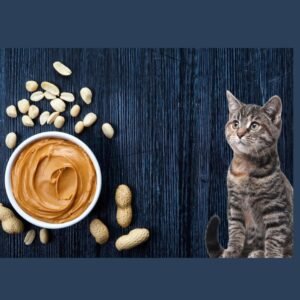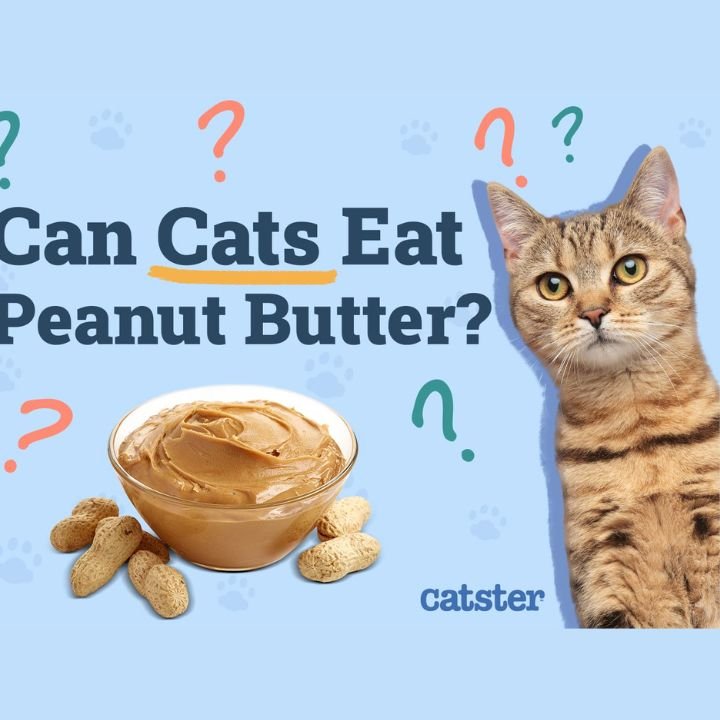As a cat owner, you might have wondered: can cats have peanut butter? It’s a common curiosity, especially since peanut butter is a popular snack for humans. But is it safe for your feline friend? In this article, we’ll explore the nutritional value of peanut butter for cats, the risks, and when it’s okay to treat your cat to a small amount of peanut butter. By the end, you’ll have a clearer understanding of whether peanut butter is a safe and enjoyable treat for your pet.
Table Of Contents
- Can Cats Have Peanut Butter? The Basics
- Nutritional Value of Peanut Butter for Cats
- The Potential Risks of Peanut Butter for Cats
- Benefits of Peanut Butter for Cats (When Given Sparingly)
- How to Safely Give Peanut Butter to Cats
- Alternatives to Peanut Butter for Cats
- Final Thoughts on Can Cats Have Peanut Butter?
Can Cats Have Peanut Butter? The Basics
First things first, can cats eat peanut butter without harm? The short answer is yes, cats can have peanut butter in small amounts. However, it is important to remember that peanut butter is not a natural food for cats, and its suitability as a treat depends on several factors, including ingredients, portion size, and frequency of consumption.
Cats are obligate carnivores, meaning their diet should mainly consist of animal-based proteins. While a tiny amount of peanut butter might not be toxic, it shouldn’t become a regular part of their diet. The occasional spoonful is unlikely to hurt your cat, but you should proceed with caution.
Read more: Moyen Poodle
Nutritional Value of Peanut Butter for Cats
Peanut butter is high in protein, healthy fats, and some vitamins and minerals, which could make it seem like a good option for your pet.
- Protein: Peanut butter contains a decent amount of protein, but it’s not complete protein for cats, as it lacks certain essential amino acids.
- Healthy Fats: Peanut butter is rich in unsaturated fats, which can provide some energy for your cat, but overconsumption could lead to weight gain.
- Vitamins and Minerals: Peanut butter has small amounts of vitamins E, B6, niacin, and folate, but these are not nutrients your cat requires in large quantities.
- Fiber: Peanut butter does contain fiber, which can aid in digestion. However, cats generally don’t need much fiber in their diet.
Despite these nutrients, peanut butter is not an ideal food for cats, as their bodies aren’t equipped to process the ingredients effectively. Cat also have specific dietary requirements that peanut butter cannot fulfill.
The Potential Risks of Peanut Butter for Cats
While peanut butter is generally safe in moderation, there are several risks that pet owners should be aware of before giving their cat this snack.
- Choking Hazard:
Peanut butter is sticky and can easily get stuck in your cat’s throat, potentially causing choking or difficulty swallowing. This is especially concerning if your cat tries to swallow large amounts at once. - Xylitol Poisoning:
One of the most dangerous ingredients for cat (and dogs) to avoid in peanut butter is xylitol, an artificial sweetener often used in sugar-free versions. Xylitol is toxic to cats, leading to insulin release, hypoglycemia, liver failure, and even death. Always check the ingredient list to ensure that the peanut butter does not contain xylitol. - Allergic Reactions:
Some cat may be allergic to peanuts or certain ingredients in peanut butter. Signs of an allergy may include itching, swelling, or gastrointestinal distress. If you suspect your cat has an allergy, stop feeding peanut butter immediately and consult a veterinarian. - Additives and Preservatives:
Many commercial peanut butter brands contain added salt, sugar, preservatives, and other artificial ingredients that aren’t suitable for cat. Too much salt can lead to sodium poisoning, which causes symptoms like vomiting, diarrhea, and lethargy.
Benefits of Peanut Butter for Cats (When Given Sparingly)
While peanut butter should never be a regular part of your cat’s diet, there are some potential benefits when given occasionally and in moderation:
1. Dental Health
Peanut butter’s thick, sticky texture may help clean your cat’s teeth. While it’s not a substitute for brushing, offering a tiny bit of peanut butter on a dental chew or a rubber toy might help remove some plaque and tartar buildup.
2. Training and Treating
If you’re trying to train your cat or get them to take medication, a small amount of peanut butter can be a great way to mask pills or motivate your cat. Just make sure you use it as an occasional training aid, not as a regular treat.
3. Encourages Play
Some cat enjoy the texture and taste of peanut butter, so it can be used as a way to encourage playfulness. Putting a small amount on a toy could engage your cat and stimulate their natural hunting instincts.
How to Safely Give Peanut Butter to Cats
If you’ve decided to give your cat a small taste of peanut butter, it’s crucial to do so safely. Here’s how to ensure it’s a safe experience:
- Choose Natural Peanut Butter:
Always opt for unsweetened, unsalted, natural peanut butter. Check the ingredient list to confirm it doesn’t contain xylitol, sugar, or other harmful additives. - Serve in Small Amounts:
Limit the portion size to a small dollop (about ¼ to ½ teaspoon). You don’t want peanut butter to become a regular part of your cat’s diet. - Monitor for Reactions:
After giving your cat peanut butter, monitor them for any signs of discomfort, allergies, or digestive upset. If you notice vomiting, diarrhea, or unusual behavior, discontinue giving them peanut butter and consult a vet. - Use as an Occasional Treat:
Peanut butter should only be given as an occasional treat, not a daily snack. It should never replace your cat’s regular meals or be used to substitute for nutritionally balanced food.
Alternatives to Peanut Butter for Cats
If you’re looking for healthier or more appropriate treats for your cat, there are plenty of alternatives to peanut butter:
- Catnip: Most cats love catnip, which is safe and natural. It can be sprinkled on toys, bedding, or even given in small amounts on its own.
- Cooked Chicken or Turkey: Lean, cooked chicken or turkey without seasoning can be a great protein-rich treat for your cat.
- Commercial Cat Treats: Look for high-quality, protein-based cat treats that cater to your cat’s specific dietary needs.
Tuna or Salmon: A small amount of tuna or salmon (without bones or seasoning) can be a tasty and protein-packed treat.
Final Thoughts on Can Cats Have Peanut Butter?
In conclusion, yes, cat can have peanut butter, but it should only be given in moderation and with caution. Peanut butter should never replace a nutritionally balanced cat diet, and you should always ensure it doesn’t contain harmful ingredients like xylitol. As with any treat, always monitor your cat for adverse reactions and consult your veterinarian if you have concerns. Ultimately, while peanut butter can be a fun, occasional treat, there are better options available that are specifically tailored to meet your cat’s dietary needs. So, the next time you’re reaching for that jar of peanut butter, think carefully about whether your cat can safely enjoy it – and if so, only in the tiniest amounts.











